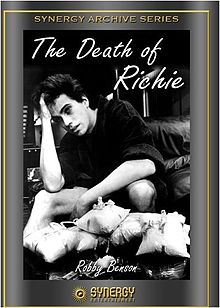
THE DEATH OF RICHIE
US, 1977, 97 minutes, Colour.
Ben Gazzara, Eileen Brennan, Robbie Benson, Lance Kerwin.
Directed by Paul Wendkos.
The Death of Richie is a very moving telemovie. It was the kind of film that was made during the 1970s – in the aftermath of all the changes in American society during the 1960s. The move to greater permissiveness, the difficulties of parents relating to children, the emergence of drug issues.
Ben Gazzara and Eileen Brennan play the parents of two sons. One of them, confused and sensitive, feels pressures all the time and takes recourse eventually to drugs. This causes further problems – even problems of violence.
Ben Gazzara was a strong presence in American cinema for almost fifty years – often more sinister than genial as in this film. Eileen Brennan was a strong character actress. This is one of the earliest films for Robbie Benson. He had appeared, at age seventeen, in such films as Jory and Jeremy. At around this part of the 70s he appeared, very effectively, in films about confused adolescents: Death Be Not Proud, Ode to Billy Joe. He later moved towards direction, beginning with Crack in the Mirror in 1989. During the 1990s he directed a great deal for television. His voice was used for that of the beast in Disney’s Beauty and the Beast.
Paul Wendkos was a prolific director of films and many telemovies.
1. The quality of this tele-movie, its style, its important drug theme as presented for home audiences?
2. The moralizing tone of the film: appropriate, a deterrent for young children, adolescents? A help for parents or not? Was there a bias in favour of the youngsters and against parents, especially in the behaviour of the father and the final comments? Or was it a balanced picture of difficult situations in the seventies?
3. For whom particularly was the film made? The parent generation, educators, adolescents themselves? For all?
4. The focus of the title on Richie, also on his death? Audience expectations from the beginning of the film? Emotional involvement with Richie? With his parents?
5. How ordinary a family were the Werners? Their home, the relationships between parents and children, the various interests, the problems? Were the parents and the children types? How would audiences of the parent generation identify with the parents? The adolescents with the adolescents?
6. How ordinary a boy was Richie? Robbie Benson's style and personality in the role? At 15, his strengths and weaknesses of character, his relationship with his father as presented even in the initial clash? His mother and her worry and love but ineffectiveness? The bonds of love between the two? His relationship with his friends? Indications of an addictive personality? His secret room, drugs, the significance of the flashbacks from his room? The amount of anger in him, the self-defeatist image? His way of talking, opting out of things like his study? His exuberance in taking the job at the cafe, his work, growing sense of failure and opting out? His relationship with his
father and selling the lucky chances? The bitterness of Sheila refusing to go to the dance? Why could he not be satisfied with this ordinary refusal? His going in to meet his friends and experience the temptation to drugs? His going to the beach with his friends, encounter with Sheila? His attitude towards his brother and not being on drugs? A good portrait of this kind of boy?
7. How strong a character was Mr Werner, his resenting the situation, his attitude towards his friends for example at the shooting practice? His attitude towards his wife, their clashes? His hard sense of justice? his saying that he could not communicate with his son? The bonds - when getting the job, selling the lucky chances? His willingness to have a court order on his son? unwillingness to go the Drug Council, to believe in any kind of group therapy? His oppressive behaviour to his son and the necessary reactions? His being confronted by Richie with a knife? The clashes with his wife? The build-up to his shooting his son? Was this credible?
8. The background of the father's attitudes, his shooting, sense of desperation, joy in his son’s success, disappointment with his failure, pressurized by modern life, his behaviour in the court, his understanding and lack of understanding? His being allowed to go free after seeing him at the funeral?
9. The portrayal of the mother as a typical mother, her pain, her not being able to understand, her exasperation and anger at times, her actually going to the Drug Council session and what she learnt, sharing with the other mothers there? Her trying to be open with Richie and her failure? Her grief at the end?
10. Richie’s friends and their behaviour, typical? Motivation, his dependence on them, the introduction of drugs as the taken for granted atmosphere? Sheila and his love, her love, rejection? The bond with his brother but his being anti-drugs?
11. How well did the film, considering it as a telemovie for home viewing, build up the tension and the atmosphere of angry confrontation? Was Richie's death comprehensible?
12. Family themes, American society, generation gap, drug abuse - the sequences of Richie's taking drugs, and the effects of them? Interest, deterrence?